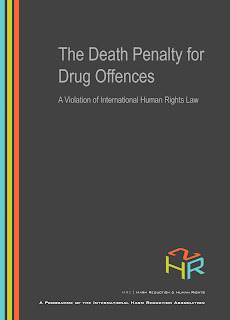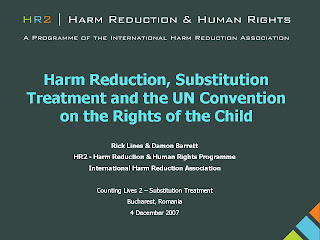Today, the Committee on Economic Social and Cultural Rights releaseed its "List of Issues", a series of questions for the Swedish government on its implementation of the International Covenant on Econimic Social and Cultural Rights.
In its fifth 'Periodic Report' to the Committee, Sweden had ommitted all mention of illegal drug use and harm reduction. HR2 and the Swedish Drug Users Union requested, in November, that the Committee raise this with the Swedish government.
We are very pleased that the Committee has, indeed, taken up this request and has asked the Swedes to "provide disaggregated data concerning the incidence of HIV/AIDS, in particular regarding the coincidence of drug use and HIV/AIDS and indicate how successful harm reduction measures have been (such as needle exchange programmes), whether they are foreseen to be scaled, and whether such programmes are foreseen in detention facilities?"
We now await the Swedish government's response, which must be in time for its meeting with the Committee in November 2008
Thursday, 13 December 2007
Sweden, harm reduction and the right to health: An update
Monday, 10 December 2007
IHRA launches report on the death penalty for drug offences
 On 10th December 2007 – to coincide with International Human Rights Day – IHRA released a major report calling for an end to the use of the death penalty for drug offences around the world. The report concludes that the on-going execution of drug offenders is a violation of international human rights law.The report is entitled ‘The Death Penalty for Drug Offences: A Violation of International Human Rights Law’ and was written by Rick Lines.
On 10th December 2007 – to coincide with International Human Rights Day – IHRA released a major report calling for an end to the use of the death penalty for drug offences around the world. The report concludes that the on-going execution of drug offenders is a violation of international human rights law.The report is entitled ‘The Death Penalty for Drug Offences: A Violation of International Human Rights Law’ and was written by Rick Lines.
It is the first major report from HR2, IHRA’s new harm reduction and human rights monitoring and policy analysis programme. The report emphasises how the harms faced by people who use drugs do not only include health harms such as HIV and hepatitis C infections, but also the effects of repressive law enforcement activities. While the number of countries practicing capital punishment has steadily decreased over the past twenty years, this report demonstrates that the number of countries using the death penalty for drug offences has steadily increased.Across the world, 133 countries have abolished the death penalty in law or in practice. However, of the 64 countries that have retained capital punishment, half of which apply these punishments to drug-related offences (whether they be drug possession or drug trafficking offences). In one of the most shocking examples, the Chinese Government celebrates the United Nation’s ‘International Day Against Drug Abuse and Illicit Trafficking’ each year by publicly executing people for drug-related crimes.The International Covenant on Civil and Political Rights (ICCPR) - one of the main UN human rights treaties – states that the death penalty may only be applied to the “most serious crimes”. Both the UN Human Rights Committee and the UN Special Rapporteur on Extrajudicial, Summary or Arbitrary Executions have stated that drug offences do not constitute “most serious crimes” - making executions for such offences a violation of international human rights law.Commenting on the report launch, Professor Gerry Stimson (IHRA’s Executive Director) said, “Capital punishment for drug offences is but one illustration of how human rights have been sacrificed in the name of the ‘war on drugs’. Unfortunately, the death penalty is not the only example of such abuses worldwide. Repressive law enforcement practices, the denial of health services to drug users and the spread of HIV infection among people who inject drugs, due to lack of access to harm reduction programmes, are far too common in many countries across the globe.”
Tuesday, 4 December 2007
IHRA speaks at UNICEF meeting in Bucharest
Presentation made by IHRA's HR2 programme at the UNICEF and Romanian Harm Reduction Network "Counting Lives 2" conference in Bucharest.



